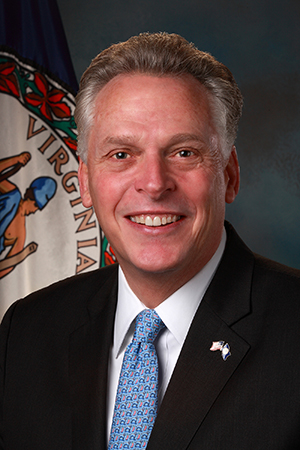Virginia governor formally pardons 'Norfolk Four' wrongly convicted in 1997 rape and murder case

Virginia Gov. Terry McAuliffe.
The so-called “Norfolk Four” Navy veterans convicted of rape and murder after being coerced into false confessions were formally pardoned Tuesday by Virginia Gov. Terry McAuliffe, the Washington Post and the Associated Press report.
The men served years in prison for the 1997 rape and murder of 18-year-old Michelle Moore-Bosko, the wife of another sailor who was soon to return from deployment at sea. The men were wrongly convicted although Norfolk police had information pointing to the actual murderer within two weeks of Moore-Bosko’s death.
Danial Williams, Derek Tice and Joseph Dick were convicted of rape and murder. Facing the death penalty, they entered plea agreements and were sentenced to life in prison. Eric Wilson was acquitted of murder but convicted of rape and spent more than eight years in prison. Wilson was released from prison before then-Gov. Timothy Kaine in 2009 conditionally pardoned and released the other three.
The Innocence Project took on the case in 2005 and filed petitions for clemency. Lawyers continued to press for full clemency after the conditional pardons.
The lead police detective on the case, Robert Glenn Ford, got the men, one at a time in succession, to admit to the killing and testify against one another, despite the fact that the crime scene did not indicate a large number of assailants. In 2010, Ford was convicted, in an unrelated matter, of accepting money from criminals in exchange for helping them get out on bond or having their sentences reduced. He was sentenced to 12½ years in prison.
The Norfolk Four saga began with the arrest of seven sailors on capital murder charges, although DNA at the scene matched none of them. Prosecutors dropped charges against three of them when their alibis were confirmed.
In 1999, an inmate named Omar Ballard wrote a letter to a friend and confessed to the crime. His DNA matched the crime scene DNA. He said he acted alone, but police and prosecutors were unrelenting with the case against the four sailors.
Last year, U.S. District Judge John Gibney of the Eastern District of Virginia held evidentiary hearings on the case because he recognized the continuing consequences of wrongful convictions. For example, Wilson was unable to adopt his stepson because he was still registered as a convicted sex offender.
“It is time for the Commonwealth to free these men of the continuing shackles of their conviction,” Gibney wrote. “By any measure, the evidence shows the defendants’ innocence. … No sane human being could find them guilty.”
The Virginia attorney general’s office subsequently conceded error in the case, saying it would end pursuit of prosecutions against Dick and Williams and dismissed all charges against Tice.
“It is truly a shame that they have had to fight so hard for so long to be fully pardoned,” said Donald Salzman, who represented Williams.



